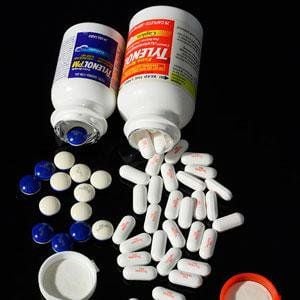Racecadotril 10mg is a medication used to treat acute diarrhea and can be used for both adults and children. It is essential to refer to information about dosage and precautions before using the medication to avoid unwanted side effects.
1. What is Racecadotril 10mg? What are its uses?
Racecadotril 10mg contains the active ingredient Racecadotril. When ingested, this ingredient is quickly metabolized into Thiorphan, a substance known for its ability to inhibit the enzyme enkephalinase released in the submucosal and muscular layers of the intestine.
After being metabolized into Thiorphan, Racecadotril is further converted into S-methyl and excreted through urine, feces, or lungs. With this mechanism, Racecadotril 10mg is highly effective in treating acute diarrhea.
2. Indications and Contraindications of Racecadotril 10mg
2.1. Indications
Racecadotril 10mg is commonly indicated for treating the following conditions:
Acute diarrhea in adults, children, and infants over 3 months old.
Used as an adjunctive treatment in cases of diarrhea caused by various reasons.
2.2. Contraindications
Despite its effectiveness, Racecadotril is contraindicated in certain individuals:
- Patients with a history of allergy or hypersensitivity to Racecadotril.
- The medication contains sucrose, making it unsuitable for individuals with rare hereditary problems of fructose intolerance. People with glucose-galactose malabsorption syndrome or sucrase-isomaltase deficiency should also avoid this medication.
- Individuals with liver or kidney impairment, pregnant women, and breastfeeding mothers.
3. How to Use and Dosage of Racecadotril 10mg
3.1. How to Use
Racecadotril 10mg is available in powder form. Simply dissolve the powder in water and drink immediately after mixing. For children who have difficulty taking medication, the powder can be mixed with food or milk.
It is recommended to use Racecadotril 10mg continuously until normal stools are achieved. However, do not use the medication for more than 7 days without a specialist's prescription.
3.2. Dosage
The dosage of Racecadotril 10mg varies between adults and children:
- For individuals over 15 years old and adults: Use 100mg three times a day. The interval between doses is 8 hours, with a total daily dose not exceeding 400mg.
- For children, the dosage is based on weight and age:
- For children aged 1-9 months (weighing less than 9 kg): Take 1 sachet of 10mg four times a day on the first day, then increase to 1 sachet (10mg) three times a day in the following days.
- For children aged 9-30 months (weighing 9-13 kg): Take 2 sachets of 10mg four times a day on the first day, then increase to 2 sachets of 10mg three times a day in the following days.
- For children aged 30 months to 9 years (weighing 13-27 kg): Take 1 sachet of 30mg four times a day on the first day, then increase to 1 sachet of 30mg three times a day in the following days.
- For children aged 9-15 years (weighing more than 27 kg): Take 2 sachets of 30mg four times a day on the first day, then increase to 2 sachets of 30mg three times a day in the following days.
The dosage information is for reference only; consult a doctor for the appropriate dosage before use.
4. Side Effects of Racecadotril 10mg
During the use of Racecadotril 10mg, users may experience some side effects such as drowsiness, fatigue, rash, constipation, nausea, headache, and dizziness. If these side effects become severe, inform your doctor immediately for timely management.
5. Drug Interactions
Currently, there are no documented interactions between Racecadotril 10mg and other medications. However, it is advisable to inform your doctor about all medications, supplements, and herbs you are using to avoid potential interactions.
6. Some Precautions When Using Racecadotril 10mg
During the treatment of diarrhea with Racecadotril 10mg, patients should consider the following:
- Combine with rehydration therapy to prevent dehydration due to diarrhea, helping to control the condition quickly.
- For breastfeeding infants, continue normal breastfeeding. However, for infants using formula, consult a doctor about whether to continue using it. Experts suggest that during diarrhea, the digestive capacity of infants decreases.
- Additionally, the intestinal villi cells are easily damaged, making it difficult to absorb the components in formula milk.
- Pregnant and breastfeeding women should not self-medicate with Racecadotril 10mg.
- Store Racecadotril 10mg at room temperature, avoid storing it in the freezer, refrigerator, or humid places, as high temperatures can alter the medication's components, potentially causing toxicity.
- Check the expiration date of Racecadotril 10mg before use, and do not use it if it has expired.
The above information helps you understand more about Racecadotril 10mg and how to use it correctly to achieve the best results. If symptoms of acute diarrhea persist or worsen, such as more than 6 bowel movements per day, weight loss, bloody stools, or mucus in stools, inform your doctor immediately for the best support.
To arrange an appointment, please call HOTLINE or make your reservation directly HERE. You may also download the MyVinmec app to schedule appointments faster and manage your reservations more conveniently.













